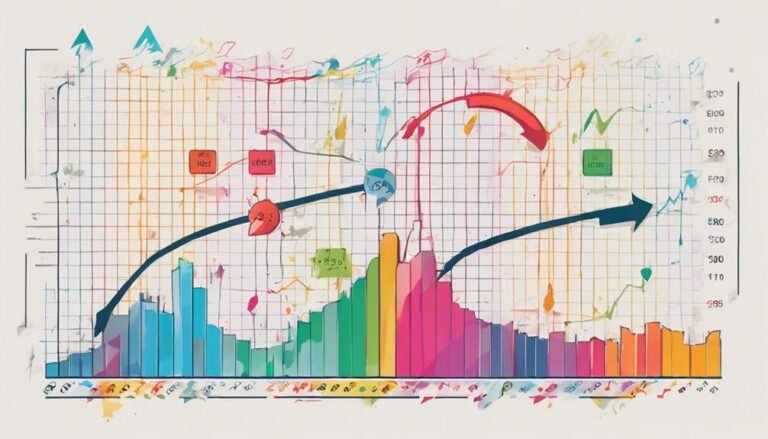Quantitative Risk Analyst Skills
To excel as a quantitative risk analyst, you must possess a blend of key skills including mathematical proficiency, data analysis, programming, financial knowledge, risk management expertise, and strong communication skills.
But what truly sets apart a top-tier professional in this field? The answer lies in the ability to not only understand the numbers but also to interpret them in a way that drives strategic decision-making and ultimately mitigates risks effectively.
Key Takeaways
- Utilize advanced risk modeling for nuanced risk assessment.
- Master data manipulation through programming for accurate analysis.
- Communicate risk analysis clearly for effective decision-making.
- Conduct stress testing to evaluate extreme scenario impacts accurately.
Mathematical Proficiency
To excel as a quantitative risk analyst, you must possess a high level of mathematical proficiency. Mathematical modeling and statistical analysis are at the core of your daily tasks. Understanding complex mathematical concepts and being able to apply them effectively is important in evaluating and managing risks within the financial sector.
Mathematical modeling involves creating mathematical representations of real-world situations to analyze and predict outcomes. As a quantitative risk analyst, you'll use these models to evaluate the probability of various risks and their potential impact on financial assets. Statistical analysis plays a key role in interpreting data trends, identifying patterns, and making informed decisions based on probability and risk evaluation.
Your ability to manipulate large datasets, apply statistical techniques, and interpret results accurately will determine the effectiveness of your risk management strategies. Developing a strong foundation in mathematical proficiency won't only enhance your analytical skills but also enable you to provide valuable insights and recommendations to mitigate potential risks effectively.
Data Analysis Skills
Developing strong data analysis skills is essential for a quantitative risk analyst to effectively evaluate and manage risks within the financial sector. To excel in this area, mastering data visualization techniques and statistical modeling techniques is critical.
Here are three key aspects to focus on:
- Data Visualization Techniques: Proficiency in data visualization tools like Tableau or Power BI is essential for creating insightful visual representations of complex financial data. Being able to present information in a clear and visually appealing manner enhances your ability to communicate findings effectively.
- Statistical Modeling Techniques: A deep understanding of statistical methods such as regression analysis, time series analysis, and Monte Carlo simulation is vital for accurately evaluating and predicting financial risks. These techniques help in quantifying uncertainties and making informed decisions based on data-driven insights.
- Interpreting Results: Being able to interpret the results of data analyses accurately is paramount. You must possess the ability to draw meaningful conclusions from statistical models and effectively communicate the implications to stakeholders.
Programming Abilities
You need to understand that coding proficiency is essential for a quantitative risk analyst.
Your data manipulation expertise will be put to the test and will require a deep understanding of algorithms to implement them effectively.
Be prepared to showcase your algorithm implementation skills to excel in this role.
Coding Proficiency Essential
Mastering coding proficiency is a fundamental skill for quantitative risk analysts in today's data-driven financial landscape. To excel in this area, consider the following:
- Understanding Software Development: Proficiency in software development principles is essential for creating efficient and scalable risk analysis tools.
- Implementing Machine Learning Algorithms: Knowledge of machine learning techniques allows for the development of predictive models that can assess and mitigate financial risks effectively.
- Utilizing Data Visualization Tools: Proficiency in tools like Python libraries or R packages can aid in visualizing complex risk data for better decision-making.
Data Manipulation Expertise
Need to enhance your quantitative risk analysis skills? Mastering data manipulation expertise through programming abilities is crucial in managing the complexities of financial data analysis.
By being adept at programming languages like Python, R, or SQL, you can effectively clean and preprocess large datasets for analysis. Utilizing data visualization techniques allows for the representation of complex data in a visually understandable manner, aiding in decision-making processes.
Statistical software applications such as SAS or MATLAB can assist in performing advanced statistical analysis on financial data sets. Having a strong foundation in programming not only streamlines data manipulation tasks but also enables you to extract meaningful insights from intricate financial datasets efficiently.
Algorithm Implementation Skills
Developing proficiency in algorithm implementation skills through programming abilities is essential for enhancing your quantitative risk analysis capabilities. To excel in this area, focus on the following key aspects:
- Algorithm Optimization: Master techniques to improve the efficiency and effectiveness of algorithms in risk analysis models.
- Performance Testing: Conduct thorough performance evaluations to guarantee your algorithms meet the required speed and accuracy standards.
- Code Refactoring: Enhance your programming skills by restructuring and optimizing code to make it more readable, maintainable, and efficient.
Financial Knowledge
Possessing a strong foundation in financial knowledge is essential for a quantitative risk analyst to effectively evaluate and manage risks in various financial scenarios. Understanding economic theory and market trends allows you to make informed decisions when assessing potential risks in the market. Here is a table outlining key areas of financial knowledge crucial for a quantitative risk analyst:
| Financial Knowledge | Description |
|---|---|
| Economic Theory | Understanding how economic factors such as inflation, interest rates, and GDP growth impact financial markets. |
| Financial Instruments | Knowledge of different financial instruments like stocks, bonds, derivatives, and their risk-return profiles. |
| Financial Markets | Awareness of how different financial markets operate, including equity, fixed income, and commodity markets. |
| Valuation Techniques | Proficiency in various valuation methods such as discounted cash flow (DCF), comparable company analysis, etc. |
| Risk Metrics | Familiarity with risk metrics like Value at Risk (VaR), standard deviation, beta, and how to interpret them. |
Risk Management Expertise
You must possess advanced risk modeling skills to effectively manage and mitigate potential risks in financial environments.
Additionally, the ability to conduct scenario analysis is vital in identifying and preparing for various risk scenarios.
These skills are fundamental in developing sound risk management strategies that safeguard the interests of the organization.
Advanced Risk Modeling
How can advanced risk modeling enhance your risk management expertise?
Advanced risk modeling plays a critical role in expanding your risk management skills by providing a more sophisticated understanding of potential risks and their potential impact. Here are three key benefits of incorporating advanced risk modeling techniques:
- Enhanced Portfolio Optimization:
Advanced risk modeling allows for more precise portfolio optimization strategies, helping you allocate resources more effectively.
- Improved Stress Testing:
Through advanced risk modeling, you can conduct more thorough stress tests, enabling you to assess the resilience of your portfolio under extreme scenarios.
- Better Risk Assessment:
Advanced risk modeling provides a more nuanced view of risks, allowing for a more accurate assessment of potential threats and opportunities in your portfolio.
Scenario Analysis Skills
Advanced risk modeling equips you with the necessary foundation to develop proficient scenario analysis skills in risk management expertise. When it comes to scenario analysis, two key techniques are essential: stress testing and sensitivity analysis.
Let's break them down in the table below:
| Scenario Analysis Techniques | Description |
|---|---|
| Stress Testing Techniques | Involves testing the impact of extreme and adverse scenarios on a portfolio or financial system. Helps in understanding vulnerabilities and potential losses under severe conditions. |
| Sensitivity Analysis Methods | Examines how changes in individual variables or assumptions affect the overall outcome. Identifies key risk drivers and their influence on the risk profile. |
Mastering these techniques enhances your ability to assess and mitigate risks effectively in complex financial environments.
Communication Skills
Effective communication is a fundamental skill for quantitative risk analysts, enabling clear exchange of complex information with stakeholders. To excel in this area, you should focus on honing your presentation techniques, interpersonal abilities, negotiation skills, and public speaking expertise. Here are three key aspects to contemplate:
- Clarity: When communicating risk analysis findings, aim to be concise and articulate, avoiding jargon that may confuse stakeholders.
- Adaptability: Tailor your communication style to different audiences, such as executives, clients, or technical teams, to make sure your message resonates effectively.
- Active Listening: Enhance your understanding of stakeholder needs by actively listening to their feedback and incorporating it into your risk analysis reports.
Conclusion
To sum up, as a quantitative risk analyst, you must possess a diverse set of skills to navigate the complex world of risk management.
Your mathematical proficiency, data analysis skills, programming abilities, financial knowledge, risk management expertise, and communication skills are all essential for success in this field.
Just as each piece of a puzzle fits together to create a complete picture, your skills work in harmony to mitigate risks and secure the stability and growth of your organization.







